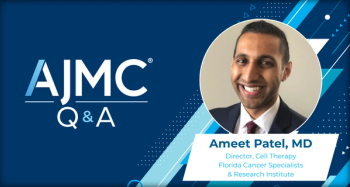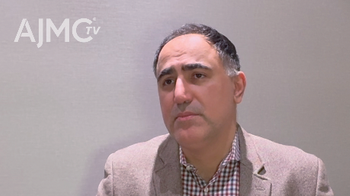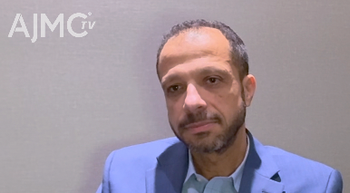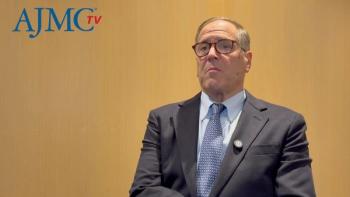
Tina Bhatnagar, DO, speaks to the importance of diversity in clinical trials and the need to remove barriers, enroll underrepresented backgrounds, and reflect real-world health conditions.

Tina Bhatnagar, DO, speaks to the importance of diversity in clinical trials and the need to remove barriers, enroll underrepresented backgrounds, and reflect real-world health conditions.

Kathrin Dvir, MD, MSc, concludes by highlighting the importance of outreach, education, and trusted messaging to improve breast cancer screening adherence.

Ameet Patel, MD, concludes by outlining strategies to overcome operational, financial, and payer challenges in delivering advanced multiple myeloma therapies.

Kathrin Dvir, MD, MSc, discusses how biomarker-driven care, targeted therapies, and evolving sequencing are shaping modern breast cancer treatment.

Ameet Patel, MD, explains how multiple myeloma treatment settings depend on safety, logistics, and patient needs.

Experts at a roundtable in Boston, Massachusetts, on November 19, 2025, discussed multidisciplinary strategies for obesity care, including systemic and operational barriers and scalable solutions to promote patient ownership.

As more oral cancer therapies become available, medically integrated dispensing models are increasingly vital, says Kenneth Komorny, PharmD, BCPS.

Susan Vadaparampil, PhD, MPH, explains that aligning clinical trials with community needs can improve enrollment diversity.

Ameet Patel, MD, discusses scaling CAR T-cell therapy and bispecific therapies to improve access and potentially cure multiple myeloma.

Medically integrated dispensing (MID) models help build patient trust in pharmacists, which can help improve adherence, explains Kenneth Komorny, PharmD, BCPS.

Community partnerships and trial design reforms can reduce travel barriers and improve underserved patient representation, said Amir Fathi, MD.

Patient navigators, community health workers, and/or peer advocates serve as trusted community resources for patients, Susan Vadaparampil, PhD, MPH, says.

Medically integrated dispensing improves oncology treatment coordination through EMR-based care, but payer restrictions remain a key barrier.

Medically integrated dispensing is well-positioned to support value-based oncology care models and closer patient follow-up and monitoring, says Katherine Tobon, PharmD, BCOP.

MID in oncology also enhances treatment adherence and improves patient outcomes, according to Kenneth Komorny, PharmD, BCPS.

Medically integrated dispensing (MID) improves monitoring and supports value-based care, but startup costs and payer barriers remain, notes Katherine Tobon, PharmD, BCOP.

Susan Vadaparampil, PhD, MPH, highlights disparities in cancer outcomes and trial enrollment but underscores that linking community screening programs with cancer centers may help.

Targeted therapies, bispecifics, and CAR T-cell therapies are giving patients with multiple myeloma hope for long-term remission or a potential cure.

Experts discuss the impact of biomarker testing on GU and lung cancers, as well as myeloma, emphasizing its role in personalized treatment and patient care advancements.

Explore the complexities of modern oncology, including precision medicine, CAR T-cell therapies, and challenges in breast cancer care and payer friction.

Jose Guzman Garcia, PharmD, MHA, BCCCP, discusses key pharmacy initiatives at UC Davis Health.

Bhavana (Tina) Bhatnagar, DO, discusses the transformative role of AI in enhancing patient care at West Virginia University Cancer Institute.

Delays in breast cancer diagnosis and treatment highlight the need for improved human capital investment in health care systems, explains Adam Brufsky, MD, PhD.

Danielle Roman, PharmD, BCOP, explains why a collaborative, team-based approach is essential to solving resource challenges in community cancer care.

Prerna Mewawalla, MD, discusses innovative strategies to enhance cancer care access, reduce clinician burden, and improve clinical trial diversity in real-world settings.

Despite the impact of targeted treatment in oncology, much work remains to bring these therapeutics to all patients, says Bhavana (Tina) Bhatnagar, DO.

Kavita Nair, PhD, FAAN, shares how new therapies and ongoing clinical trials are reshaping the future of neurological care and offering new hope to patients.

Adam Brufsky, MD, PhD, addresses how the COVID-19 pandemic affected breast cancer screening rates across Pittsburgh.

Oncology specialist Jasmine Eugene, PharmD, explains how pharmacists practicing at the top of their license help close cancer care gaps amid provider shortages.

Kavita Nair, PhD, FAAN, discusses academic medical centers' unique role in diagnosing and managing neurodegenerative diseases.